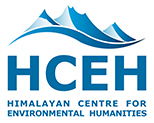
RTC students and faculty participated in a workshop on Ecotourism in Gangtok, Sikkim from March 30th to April 2nd. The workshop was facilitated by the University of Sikkim and also included participants from Kathmandu University. Researchers from all three institutions presented findings related to ecotourism research that was conducted over the last 18 months.
The Royal Thimphu College (RTC) launched its first interdisciplinary research and educational centre, ‘Himalayan Centre for Environmental Humanities’ (HCEH) in Bhutan on 11 October 2021 during the inaugural of the publishing workshop on ‘Storying Climes’. The HCEH organizing committee consists of Chairperson Jelle Wouters, Associate Professor; Shiva Raj Bhattarai, Dean of Academic Affairs; Samir Patel, Dean of Development and External Relations, and colleagues from the Social Sciences and Humanities faculties at RTC. The Centre is an outcome of prior and ongoing collaborative research projects with the Himalayan University Consortium (HUC). It aims to develop new research strategies in recognition that environmental issues today are deeply entangled in questions of human behaviour, structures, values, and beliefs, and that humanist and more-than-human approaches to the environment are fundamental to develop panbeing intelligence and to secure multibeing sustainable futures.
We recognize that the Himalayan region is vulnerable to anthropogenic impacts, and thus to potentially catastrophic consequences, both for lived ecologies, biodiversity, and life within the Himalaya itself, as well as for the over two billion people living in adjacent alluvial plains for whom Himalayan gifts such as monsoons, sediments, and rivers are a vital life-source.
The Centre focuses on establishing innovative research methodologies to better understand human-environment interactions, studying and bringing indigenous knowledge and practices into dialogue with the sciences, and envisioning and putting multispecies ethics and justice into practice. It promotes research, teaching, and interdisciplinary alliances in the environmental humanities across the greater Himalayan region and aims to leverage Himalayan insights to contribute to new ways of thinking and acting in relation to planetary problems, from its base in Bhutan, which is heir to distinct knowledge traditions in the human-environment interface.
To enhance the Centre, RTC has also started a reading group, occasional seminar series, and a course within the undergraduate environmental management degree programme on environmental humanities, with the purpose to elucidate students on the emergence of this discipline to understand the environment from a broader perspective. The Centre seeks to promote research, teaching and interdisciplinary alliances across the Himalayan region and further engage around the globe. HCEH plans two ways to internationalize the centre – through advisory bodies engaging the national and international scholars, and through institutional partnerships.
